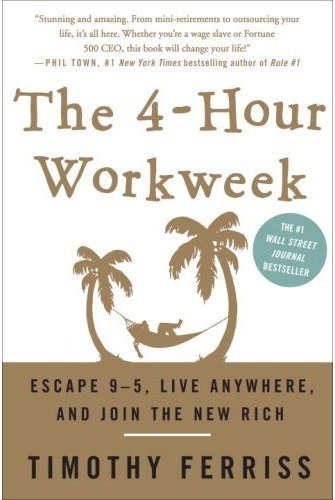I just downloaded the free audio version of the book called “Free” by Chris Anderson (iTunes required). The premise of the book is eventually everything digital becomes free. You can also see the text version of the book for free on Google Books. I haven’t read or listened to it yet but I’ll follow up when I am done.
Category: Books
The 4 Hour Workweek
 I discovered Tim Ferriss because of the podcasts he has been doing with Kevin Rose. I loved most of what Tim has to say, and I find him completely fascinating. One of the episodes mentioned Ferriss who wrote the 4-Hour Workweek and since I loved what he had to say I naturally wanted to read his book. Now those of you who know me know I’m not an avid reader, I would much rather watch a movie or YouTube video synopsis as I don’t have much of an attention span to sit in one place for more than 5 minutes. I have to tell you his book captivated me, I loved it, and it made me do a lot of thinking about the way the world operates (and in my job communicates). I took some notes and decided to type them up so anyone who reads this post could benefit. I highly recommend buying the book, but if you aren’t going to buy the book, here are some of the things I found interesting (note these are my notes, so it may not all make sense to you). Hope you find this useful and buy the book!
I discovered Tim Ferriss because of the podcasts he has been doing with Kevin Rose. I loved most of what Tim has to say, and I find him completely fascinating. One of the episodes mentioned Ferriss who wrote the 4-Hour Workweek and since I loved what he had to say I naturally wanted to read his book. Now those of you who know me know I’m not an avid reader, I would much rather watch a movie or YouTube video synopsis as I don’t have much of an attention span to sit in one place for more than 5 minutes. I have to tell you his book captivated me, I loved it, and it made me do a lot of thinking about the way the world operates (and in my job communicates). I took some notes and decided to type them up so anyone who reads this post could benefit. I highly recommend buying the book, but if you aren’t going to buy the book, here are some of the things I found interesting (note these are my notes, so it may not all make sense to you). Hope you find this useful and buy the book!
- The goal of the book is to free up time and automate your income
- Ferriss nearly fails kindergarten (begins his disdain for authority)
- Ferriss had a joy of baseless overconfidence
- Don’t be a “living dead”
- Would you tell me, please, which way I out to go from here? That depends a good deal on where you want to get to, said the Cat. I don’t much care where…said Alice. Then it doesn’t matter which way you go, said the Cat. – Lewis Carroll, Alice in Wonderland.
- Have mini-retirements throughout life
- Focus on being productive instead of busy
- There is never a good time to have a baby, just like there is never a good time to quit your job to do what you love
- Ask for forgiveness, not permission
- Emphasize strengths, don’t fix weaknesses
- Risks aren’t that scary once you take them
- Most people will choose unhappiness over uncertainty
- Conquering fear = defining fear
- “It’s lonely at the top. Ninety-nine percent of people in the world are convinced they are incapable of achieving great things, so they aim for the mediocre. The level of competition is thus fiercest for “realistic” goals, paradoxically making them the most time and energy consuming.
- What would you like to do if there was no chance of failing?
- List 5 things you dream of having, being – great cook, doing = visiting Thailand
- What would you do day to day if you had $100 million in the bank?
- What would make you most excited to wake up in the morning to another day?
- Being effective vs. being efficient
- What you do is infinitely more important than how you do it.
- How is it possible that all the people of the world need exactly 8 hours to accomplish their work?
- Since we have 8 hours to fill, we fill 8 hours
- Parkinson’s Law dictates that a task will swell in (perceived) importance and complexity in relation to the time allotted for its completion. If I gave you 24 hours to complete a project, the time pressure forces you to focus on execution, and you have no choice but to do only the bare essentials. If I give you a week to complete the same task, it’s six days of making a mountain out of a molehill.
- Am I being productive or just being active?
- Are you inventing things to do to avoid the important?
- “There is no difference between a pessimist who says, “Oh, it’s hopeless, so don’t bother doing anything,” and an optimist who says, “Don’t bother doing anything, it’s going to turn out fine anyway.” Either way, nothing happens.” – Yvon Chouinard, founder of Patagonia
- Reading, after a certain age, diverts the mind from its creative pursuits. Any man who reads too much and uses his own brain too little falls into lazy habits of thinking. – Albert Einstein
- Think back to your days on the playground. There was always a bully and countless victims, but there was also that one small kid who fought like hell, thrashing and swinging for the fences. He or she might not have won, but after one or two exhausting exchanges, the bully chose not to bother him or her. It was easier to find someone else. Be that kid.
- My contacts now know that I don’t respond to emergencies, so the emergencies some who don’t exist o don’t come to be. Problems, as a rule, solve themselves, or disappear if you remove yourself as an information bottleneck and empower others.
- Emergencies are seldom that. People are poor judges of important and inflate minutiae to fill time and feel important.
- Timothy@brainquicken.com (send that address an email to see his “canned response” to getting back to you)
- Turn off the audible alert in Outlook
- Check email twice a day at 10am and 2pm
- Use 2 telephone numbers
- One for the office
- One for cell phone (emergencies)
- Order of preference for communication
- E-mail, phone, in-person meetings
Respond to voice-mail with an email
- If someone proposes a meeting, request resolution via email instead.
- Meetings should only be held to make decisions about a pre-defined situation.
- The vision is really about empowering workers, giving them all the information about what’s going on, so they can do a lot more than they’ve done in the past.
- It’s amazing how someone’s IQ seems to double as soon as you give them responsibility and indicate that you trust them
- The bottom line is you only have the rights you fight for
- Never automate something that can be eliminated
- The first rule of any technology used in a business is that automation applied to an efficient operation will magnify the efficiency. The second is that automation applied to an inefficient operation will magnify the inefficiency. – Bill Gates
- Wordtracker.com
- no-ip.com – can redirect traffic (DNS) in 5 mins instead of 24–40 hours
- Freestockphotos.com
- Getty.com – professional photos
- tollfreemax.com
- A company is stronger if it is bound by love rather than by fear. If the employees come first, then they’re happy. – Herb Keller, co-founder of Southwest Airlines
- Angel.com – get an 800# with professional voice menu
- Last but not least, my favorite quote from the book
- Slow Dance
- Have you ever watched kids on a merry-go-round? Or listened to the rain slapping on the ground? Ever followed a butterfly’s erratic flight? Or gazed at the sun into the fading night? You better slow down. Don’t dance so fast. Time is short. The music won’t last. Do you run through each day on the fly? When you ask: “how are you?” do you hear the reply? When the day is done, do you lie in your bed with the next hundred chores running through your head? You’d better slow down. Don’t dance so fast. Time is short. The music won’t last. Ever told your child, we’ll do it tomorrow? And in your haste not see his sorrow? Ever lost touch, let a good friendship die cause you never had time to call and say “hi”? You’d better slow down, don’t dance so fast. Time is short. The music won’t last. When you run so fast to get somewhere, you miss half the fun of getting there. When you worry and hurry through your day, it is like an unopened gift thrown away. Life is not a race. Do take it slower. Hear the music before the song is over.
- Slow Dance
Norman Ollestad Memoir: Crazy for the Storm
The World is Flat
I am hearing some good things about Friendman’s book and hope to some day get a chance to read it. Wikipedia has a summary of the ten “flatteners” that Friedman sees as leveling the global playing field:
- #1: Collapse of Berlin Wall–11/’89: The event not only symbolized the end of the Cold war, it allowed people from other side of the wall to join the economic mainstream. (11/09/1989)
- #2: Netscape: Netscape and the Web broadened the audience for the Internet from its roots as a communications medium used primarily by ‘early adopters and geeks’ to something that made the Internet accessible to everyone from five-year-olds to ninety-five-year olds. (8/9/1995). The digitization that took place meant that everyday occurrences such as words, files, films, music and pictures could be accessed and manipulated on a computer screen by all people across the world.
- #3: Workflow software: The ability of machines to talk to other machines with no humans involved. Friedman believes these first three forces have become a “crude foundation of a whole new global platform for collaboration.”
- #4: Open sourcing: Communities uploading and collaborating on online projects. Examples include open source software, blogs, and Wikipedia. Friedman considers the phenomenon “the most disruptive force of all.”
- #5: Outsourcing: Friedman argues that outsourcing has allowed companies to split service and manufacturing activities into components which can be subcontracted and performed in the most efficient, cost-effective way.
- #6: Offshoring: The internal relocation of a company’s manufacturing or other processes to a foreign land in order to take advantage of less costly operations there. China’s entrance in the WTO allowed for greater competition in the playing field. Now countries such as Malaysia, Mexico, Brazil must compete against China and each other to have businesses offshore to them.
- #7: Supply chaining: Friedman compares the modern retail supply chain to a river, and points to Wal-Mart as the best example of a company using technology to streamline item sales, distribution, and shipping.
- #8: Insourcing: Friedman uses UPS as a prime example for insourcing, in which the company’s employees perform services–beyond shipping–for another company. For example, UPS repairs Toshiba computers on behalf of Toshiba. The work is done at the UPS hub, by UPS employees.
- #9: In-forming: Google and other search engines are the prime example. “Never before in the history of the planet have so many people-on their own-had the ability to find so much information about so many things and about so many other people”, writes Friedman. The growth of search engines is tremendous; for example take Google, in which Friedman states that it is “now processing roughly one billion searches per day, up from 150 million just three years ago”.
- #10: “The Steroids”: Personal digital devices like mobile phones, iPods, personal digital assistants, instant messaging, and voice over Internet Protocol (VoIP).
Dr. Seus: Oh, the Places You’ll Go!
Wondering where to go and what to do in life? I’ve certainly been there, life is full of strife. Don’t worry too much although yes even I often do. Consult in Dr. Suess and you may find what you are looking for deep within you. Hope this helps those looking for answers, we hate seeing you so blue. Read on and know we all hope your biggest wishes come true.
“Congratulations!
Today is your day.
You’re off to Great Places!
You’re off and away!
You have brains in your head.
You have feet in your shoes.
You can steer yourself any direction you choose.
You’re on your own. And you know what you know. And YOU are the guy who’ll decide where to go.
Book: Predictably Irrational
Kevin Rose recommended this book on this week’s Diggnation which sounds interesting. You can buy it on Amazon here. Amazon’s description is: “Irrational behavior is a part of human nature, but as MIT professor Ariely has discovered in 20 years of researching behavioral economics, people tend to behave irrationally in a predictable fashion. Drawing on psychology and economics, behavioral economics can show us why cautious people make poor decisions about sex when aroused, why patients get greater relief from a more expensive drug over its cheaper counterpart and why honest people may steal office supplies or communal food, but not money.
According to Ariely, our understanding of economics, now based on the assumption of a rational subject, should, in fact, be based on our systematic, unsurprising irrationality. Ariely argues that greater understanding of previously ignored or misunderstood forces (emotions, relativity and social norms) that influence our economic behavior brings a variety of opportunities for reexamining individual motivation and consumer choice, as well as economic and educational policy. Ariely’s intelligent, exuberant style and thought-provoking arguments make for a fascinating, eye-opening read.”
Book: Orbit – Inspiring Stories of Ordinary People Who Led Extraordinary Lives…
This book looks like it would be a good read, here is the description from Amazon…
Review
“You probably won’t have heard of any of the people eulogized in Obit, but they will remind you of the variety of humans on earth and the absolute certainty that no matter how powerful a personality, eventually the body goes, and that what remains stays not only in people’s hearts, but in their stories.”
—Chicago Sun-Times
Product Description
Like Everything I Really Needed to Know, I Learned in Kindergarten, or Tuesdays with Morrie, Obit is a wise and deeply moving book that illuminates the human condition. For ten years, Jim Sheeler has scoured Colorado looking for subjects whose stories he will tell for the last time. Most are unknowns, but that doesn’t mean they’re nobodies. Their obituaries are sometimes humorous, sometimes heartbreaking, and chock full of life lessons as taught by the people we all pass on the street every day. And thanks to Sheeler’s brilliant and compassionate prose, it’s not too late to meet them.
Our Iceberg is Melting…
A book I am reading. Here is the summary:
“Even when it is obvious to you that change in your organization is necessary, the difficulties that loom for creating that change can be intimidating. Or perhaps the change effort is well underway in your organization, but faltering. John Kotter, Harvard Business School’s leadership and change guru, sits down with BetterManagement to talk about what he has learned about changing organizations, why some change management efforts succeed, and why others fail. This interview provides guideposts for measuring your own change effort, using Kotter’s eight-step process for successful change.
These are:
1. Create a sense of urgency
2. Pull together the guiding team
3. Develop the vision and change strategy
4. Communicate for understanding and buy-in
5. Empower others to act
6. Produce short-term wins
7. Don’t let up
8. Create a new culture
The lessons you can draw from this interview will serve you well on the job, in your family and in your community. Based on John Kotter’s pioneering work on how to make smart change happen faster and better, the interview provides invaluable guidance no matter where you are in the organization—executives, managers and aspiring leaders at any level will all benefit. And the lessons are becoming ever more important as the world around us changes faster and faster.”





